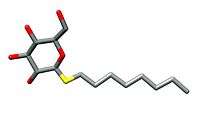n-Octyl beta-D-thioglucopyranoside
 | |
 | |
| Names | |
|---|---|
| IUPAC name
(2R,3S,4S,5R,6R)-2-(hydroxymethyl)-6-octylsulfanyl-oxane-3,4,5-triol | |
| Other names
(1S)-Octyl-β-D-thioglucoside | |
| Identifiers | |
| 85618-21-9 | |
| Jmol interactive 3D | Image |
| PubChem | 363418 |
| |
| Properties | |
| C14H28O5S | |
| Molar mass | 308.434 g/mol |
| Appearance | Colourless Waxy Semi-Solid |
| Melting point | 125 to 131 °C (257 to 268 °F; 398 to 404 K) |
| Except where otherwise noted, data are given for materials in their standard state (at 25 °C [77 °F], 100 kPa). | |
| Infobox references | |
n-Octyl β-D-thioglucopyranoside (octylthioglucoside, OTG) is a detergent that is used for cell lysis or to solubilise membrane proteins without denaturing them. This is particularly of use in order to crystallise them or to reconstitute them into lipid bilayers. It has a critical micelle concentration of 9 mM.[1]
It is an analog of the commonly used detergent octyl glucoside, the presence of the thioether linkage making it resistant to degradation by beta-glucosidase enzymes.
References
External links
- OTG bound to proteins in the PDB
This article is issued from Wikipedia - version of the Monday, November 02, 2015. The text is available under the Creative Commons Attribution/Share Alike but additional terms may apply for the media files.